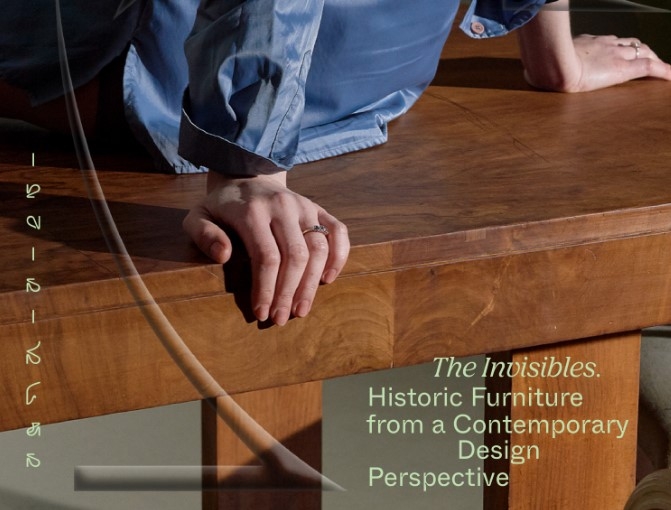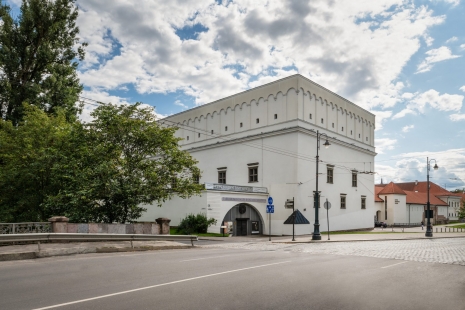The title of the exhibition pays tribute to the “invisibles” – the furniture that lives in museum repositories, often only accessible to curators, historians and conservators. In addition to representative historical furniture, the museum vaults also contain “forgotten” objects that would never be displayed or restored due to being too deteriorated or not considered valuable enough. The repository itself and its material history became the main source of inspiration for this exhibition. The curators suggest seeing the value of the objects as a reflection of Lithuania’s history.
Often there was little information about the objects in museum vaults, so the curators, together with the historian Dr. Eglė Bagušinskaitė and the restorers, searched for various historical facts and contexts. This information, interconnected in the perspective of time, materials and changing technologies, allowed them to look at the furniture subjectively. The historical research will complement the stories held in the museum repositories. The aim of the exhibition is to reveal the potential of these “silent” objects as participants of everyday life coming from different periods, and to introduce the audience to old furniture technologies, restoration features, as well as the culture of Lithuania’s and region’s historic interiors.
At the same time, the exposition presents design objects created by contemporary artists, revealing the continuity of ideas and discovering unexpected connections in the present. The exhibition features newly commissioned works by designer Kotryna Butautytė, the wood studio Natyvai, light artist Rūta Palionytė and architect Ieva Baranauskaitė, interdisciplinary art creator Dr.GoraParasit, photographer Darius Petrulaitis, Autotelic Objects (Justas Silkauskas), artist Eglė Pilkauskaitė, Išora x Lozuraitis Studio for Architecture, artist Vladas Suncovas, and international designers Audrey Large (Netherlands), Delphine Lejeune (France), Clara Schweers (Germany) and Kurina Sohn (South Korea). These artists interpret the exhibits in Lithuanian museum repositories by creating contemporary design works. In this way, design as the process of object creation extends as a way of thinking and becomes a means of appreciating historical objects, drawing attention to our current relationship with furniture and the environment.
The exhibition is truly multivocal: alongside exhibits from museum repositories and design works created by contemporary creators especially for this exhibition, it features design objects by multiple Lithuanian and foreign designers and brands, such as Dirk van der Kooij (Netherlands), Moustache (France), Tadeáš Podracký (Czech Republic), Lucas Muñoz Muñoz and Ines Sistiaga (Spain), Tuomas Markunpoika (Finland), Mantas Lesauskas, jot.jot, EMKO (Lithuania), Leo Maher (United Kingdom), Carolina Sardal Jerhov (Sweden), Benjamin Motoc (France), Studio Luuk van Laarhoven (Netherlands). These works continue to complement, extend, speak to and comment on the furniture from Lithuanian museum repositories, selected by the curators.
The architecture of the exhibition, developed in collaboration with the team of IMPLMNT architects, becomes yet another – the largest – piece of furniture on display, interpreting and deconstructing the idea of a storage shelf. After all, it is the shelves that house most of the furniture in museum repositories that is usually invisible to the public. As the space of the hall opens up, the racking structure offers different trajectories of movement through the space in historically non-linear perspectives, where old furniture from museum collections is seen from the perspective of contemporary design-thinking.
Curators: Vytautas Gečas, Monika Lipšic, Marija Puipaitė
Historical research: dr. Eglė Bagušinskaitė
The exhibition features furniture from the Lithuanian National Museum or Art, Šiauliai “Aušra” museum, the National Museum of Lithuania and the M.K. Čiurlionis National Museum of Art
Exhibition coordinator: Jūratė Meilūnienė
Graphic design: Jonė Miškinytė
Photography: Monika Jagusinskytė
Editing: Alexandra Bondarev and Ilona Klimienė
Translation: Alexandra Bondarev





